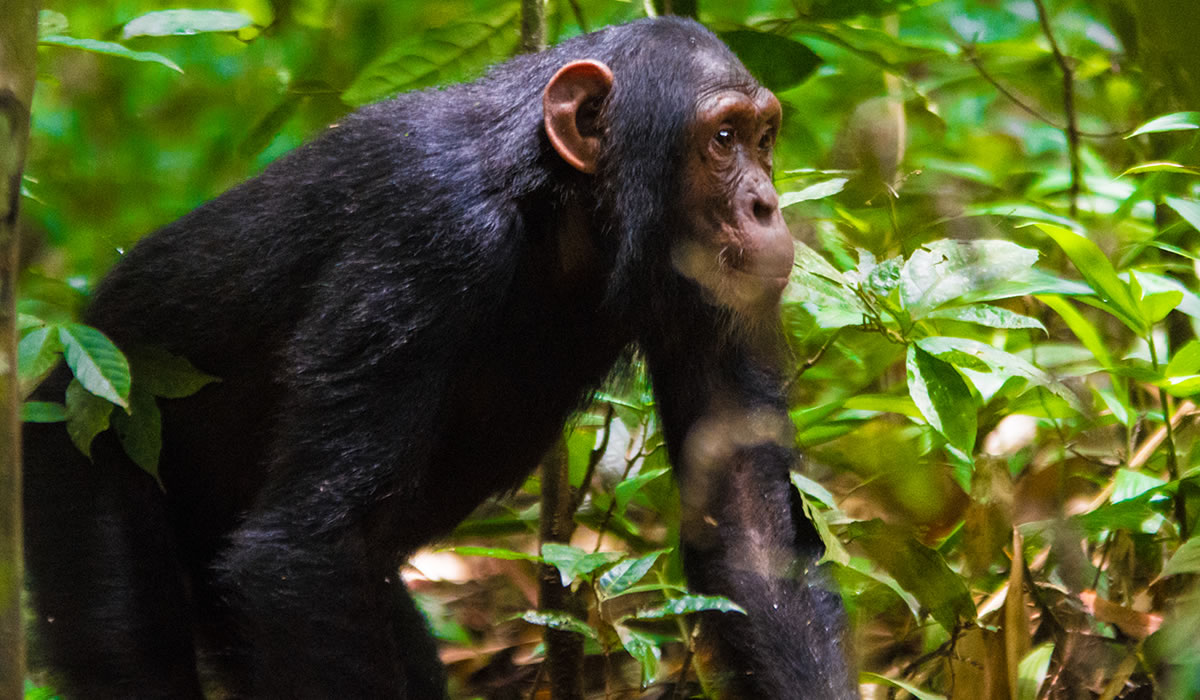Chimpanzee tracking in Nyungwe Forest National Park is one of the most exciting and enriching wildlife adventures in Rwanda. Nestled in the southwestern part of the country near the border with Burundi and the Democratic Republic of Congo, Nyungwe Forest National Park is a natural paradise that offers tourists a rare opportunity to encounter one of our closest relatives in the wild. The park’s dense rainforest, home to an incredible diversity of flora and fauna, creates a serene yet vibrant atmosphere that attracts nature enthusiasts, primate lovers, and photographers from around the world. As one of Africa’s oldest rainforests, Nyungwe is not only a sanctuary for chimpanzees but also a symbol of Rwanda’s commitment to conservation and sustainable tourism.

Overview of Nyungwe Forest National Park
Nyungwe Forest National Park covers more than 1,000 square kilometers, making it one of the largest montane rainforests in East Africa. It was established as a national park in 2004 and later recognized as part of the UNESCO World Heritage Tentative List due to its exceptional ecological importance. The park’s landscape is characterized by rolling hills, lush vegetation, beautiful waterfalls, and scenic valleys that stretch across Rwanda’s mountainous terrain.
Nyungwe is home to over 13 primate species, including the famous chimpanzees, L’Hoest’s monkeys, blue monkeys, red-tailed monkeys, and the rare owl-faced monkey. The park also boasts more than 300 bird species, 1,000 plant species, and 120 species of butterflies, making it a haven for biodiversity enthusiasts. Its high-altitude forest, ranging from 1,600 to 2,950 meters above sea level, provides a cool and misty environment that supports an array of wildlife unique to this region.
The Chimpanzee Tracking Experience
Chimpanzee tracking in Nyungwe Forest National Park is one of the most thrilling wildlife experiences in Rwanda. The adventure usually begins early in the morning, just after sunrise. Tourists gather at the park’s visitor centers, either Uwinka, Gisakura, or Kitabi, for a pre-trek briefing conducted by experienced park rangers. The guides explain the park rules, safety measures, and the behavior of chimpanzees to ensure both tourists and the primates remain safe throughout the experience.
The tracking itself can last anywhere between two and six hours, depending on the location of the chimpanzee troop on that particular day. The forest terrain can be challenging, with steep slopes and thick vegetation, but the reward of encountering a troop of chimpanzees in their natural habitat is beyond compare. As tourists follow the calls and movement patterns of the chimps, the air fills with excitement and anticipation. When the first glimpse of a chimpanzee swinging through the trees or foraging on the ground appears, the sense of wonder is overwhelming.
Chimpanzees in Nyungwe are incredibly dynamic, social, and intelligent. They live in large troops of up to 60 individuals, led by dominant males who maintain strict social hierarchies. During the one hour spent observing them, tourists can witness fascinating behaviors such as grooming, playing, feeding, and communication through vocalizations and gestures. Unlike the calm and gentle nature of gorillas, chimpanzees are fast-moving and often vocal, giving tourists a glimpse into the energetic and complex world of these remarkable primates.
Chimpanzee Groups and Habituation
Nyungwe Forest National Park is home to two main chimpanzee communities that are habituated for tourism and research. The larger group resides in the main Nyungwe Forest, while a smaller community lives in the Cyamudongo Forest, a nearby fragment of the park.
The Nyungwe group is often more challenging to track because the chimpanzees roam widely across the dense forest, but it offers a more adventurous experience for those who enjoy longer treks. The Cyamudongo group, on the other hand, is easier to locate due to the smaller forest area, making it ideal for tourists who prefer shorter and less strenuous treks. Both groups are habituated, meaning they are accustomed to human presence without being domesticated.
The habituation process takes several years and involves researchers and guides spending long periods observing the chimpanzees until they become comfortable with human observation. This ensures that tourists can view them safely while minimizing stress and disruption to the animals’ natural behaviors.
Permits and Regulations for Chimpanzee Tracking
To take part in chimpanzee tracking, tourists must obtain a chimpanzee tracking permit, which is issued by the Rwanda Development Board (RDB). As of 2025, a chimpanzee tracking permit in Nyungwe Forest National Park costs USD 100 per person for foreign tourists, USD 75 for East African residents, and RWF 5,000 for Rwandan citizens.
The number of visitors allowed per tracking session is limited to ensure minimal environmental impact and a more intimate experience. Permits should be booked well in advance, especially during the high season from June to September and December to February, when tourist numbers increase.
There are also strict regulations to protect both the chimpanzees and tourists. A maximum of one hour is allowed for viewing once the chimps are located. Tourists must maintain a distance of at least seven meters from the primates, avoid flash photography, and remain quiet while observing. Anyone suffering from contagious illnesses such as flu or cough is prohibited from joining the trek, as chimpanzees can easily contract human diseases.
Best Time for Chimpanzee Tracking in Nyungwe
Chimpanzee tracking in Nyungwe can be done throughout the year, but the best time to visit is during the dry seasons, from June to September and December to February. During these months, the forest trails are less muddy and easier to navigate, and the chances of locating the chimpanzees are higher since they tend to stay closer to the main forest areas in search of food.
However, the wet season from March to May and October to November also has its unique charm. The forest is greener, birdlife is more active, and the overall atmosphere feels more alive. For photographers and nature enthusiasts, this season offers excellent opportunities for capturing Nyungwe’s natural beauty, although the tracking may be more physically demanding due to slippery trails.
What to Pack for Chimpanzee Tracking
To fully enjoy the chimpanzee tracking experience, tourists should come well-prepared. The dense rainforest and unpredictable weather require appropriate gear and clothing. Recommended items include:
- Sturdy waterproof hiking boots
- Long-sleeved shirts and pants for protection against insects and vegetation
- Lightweight rain jacket or poncho
- Hat and sunscreen
- Binoculars for spotting other primates and birds
- Refillable water bottle and energy snacks
- Camera with extra batteries (no flash photography allowed)
A walking stick, usually provided at the park headquarters, is also helpful for navigating steep or slippery sections of the trail.
There are several excellent accommodation options catering to different budgets around Nyungwe Forest National Park, especially near Gisakura and Uwinka. These lodges and hotels offer comfort, breathtaking views, and easy access to the park’s activities.
Most lodges offer guided nature walks, birdwatching tours, and cultural visits to nearby communities, enhancing the overall experience for tourists visiting the park.
Other Activities in Nyungwe Forest National Park
While chimpanzee tracking is the main attraction, Nyungwe offers many other exciting activities that make the park a complete eco-tourism destination.
Canopy Walkway: The Nyungwe Canopy Walkway is one of the most iconic experiences in Rwanda. Suspended 60 meters above the forest floor, it provides panoramic views of the forest canopy and allows tourists to observe birds and monkeys at treetop level.
Birdwatching: With over 300 bird species, including 29 Albertine Rift endemics, Nyungwe is a birdwatcher’s paradise. Some notable species include the Rwenzori turaco, regal sunbird, and blue-headed sunbird.
Forest Hikes and Nature Trails: The park features more than 130 kilometers of well-maintained hiking trails, such as the Igishigishigi Trail, Bigugu Trail, and Kamiranzovu Swamp Trail. These routes vary in difficulty and provide opportunities to explore waterfalls, unique vegetation, and scenic viewpoints.
Cultural Experiences: Tourists can visit nearby villages to engage in cultural activities, traditional dances, and local tea plantation tours, offering insight into Rwandan rural life.
Conservation and Community Involvement
Nyungwe Forest National Park is a vital conservation area that protects not only chimpanzees but also a wealth of biodiversity crucial for ecological balance. Rwanda’s government, in partnership with conservation organizations and local communities, has made significant strides in preserving the park’s integrity.
Through eco-tourism initiatives, local residents benefit directly from park revenues. Programs such as the Revenue Sharing Scheme fund education, health care, and community development projects, ensuring that tourism contributes to local well-being. This community involvement has greatly reduced threats such as poaching and deforestation.
Nyungwe’s conservation efforts also extend to research and monitoring of primate populations, reforestation programs, and anti-poaching patrols. The park’s management prioritizes sustainable tourism practices that protect the environment while offering memorable experiences for tourists.
Chimpanzee tracking in Nyungwe Forest National Park is a truly transformative experience that connects tourists with the wonders of the natural world. Walking through the ancient rainforest, listening to the echoes of chimpanzee calls, and observing these intelligent primates in their natural environment is both thrilling and humbling. Beyond the adventure, the experience serves as a reminder of the importance of protecting endangered species and the fragile ecosystems that sustain them.
For tourists seeking a blend of wildlife, nature, and cultural immersion, Nyungwe Forest National Park offers one of the best eco-tourism experiences in Africa. With its stunning landscapes, diverse wildlife, and world-class hospitality, Nyungwe stands as a shining example of Rwanda’s dedication to conservation and sustainable development.


